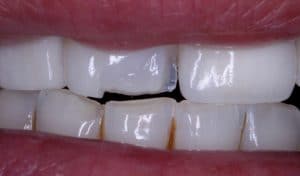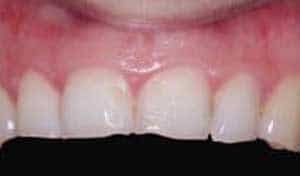Bruxism / Grinding
If you answered yes to any of these questions you may be suffering from Bruxism Grinding.
If you are suffering with the painful side effects of bruxism, here are a few reasons you might call us for help.
Why choose us?
Factors and further informations
If you think you suffer from bruxism/grinding, let us help to get you to a better place!
If you’re still unsure if you’re grinding your teeth or would like to know more, you might find the following information helpful.
Bruxism or grinding
Bruxism or grinding is characterized by the grinding of the teeth and is typically accompanied by the clenching of the jaw. It is an oral parafunctional activity that occurs in most humans at some time in their lives. It is one of the most commonly known sleep disorders.
Here are a few questions you can ask yourself if you think you might have a problem with bruxism/grinding your teeth and why it’s something you shouldn’t ignore.
Do I suffer from any of the following?
- headache, jaw joint and/or ear pain
- aching teeth, particularly just after waking up
- aching and/or stiffness of the face and temples just after waking up
- aching or stiffness in the jaws while chewing, particularly during breakfast
- clenching the jaw when angry, anxious or concentrating
- temperature-sensitive teeth
- cracked or chipped tooth enamel
- tooth indentations on the tongue
- raised tissue on the inside of the cheek caused by biting
Has my partner or family said they have heard me grinding at night?
The following factors are associated with bruxism:
- Disturbed sleep patterns and other sleep disorders (obstructive sleep apnoea, hypopnea, snoring, moderate daytime sleepiness)
- Malocclusion, in which the upper and lower teeth occlude in a disharmonic way, e.g. through premature contact of back teeth
- Relatively high levels of consumption of caffeinated drinks and foods, such as coffee, colas, and chocolate
- High levels of blood alcohol
- Smoking
- High levels of anxiety, stress, work-related stress, irregular work shifts, stressful profession and ineffective coping strategies
- Drug use, such as SSRIs and stimulants, including methylenedioxymethamphetamine (ecstasy), methylenedioxyamphetamine (MDA), methylphenidate and other amphetamines, including those taken for medical reasons
Effects of Bruxism
- cracked tooth enamel
- more wear and tear on the teeth than is normal
- broken teeth or broken restorations
- strain on the jaw joint
- pain in the jaw joint or limited movement
- sore jaw muscles
- tooth loss
- enlargement of the jaw muscles
Treatment
A dental splint is a way to reduce the damage to teeth.
Useful Links
Book an Appointment
by calling us on 02 4647 4570
Our Location
Suite 3, 20 Somerset Ave Narellan NSW 2567
Connect with Us
©2008- First Choice Dental. All right reserved. Narellan Dentist





